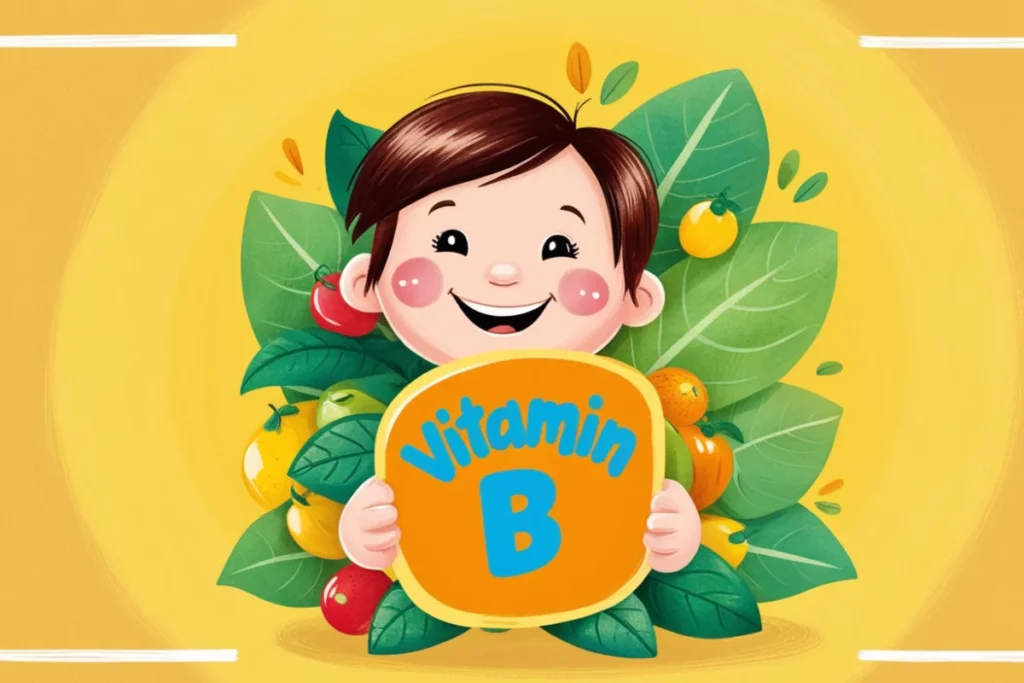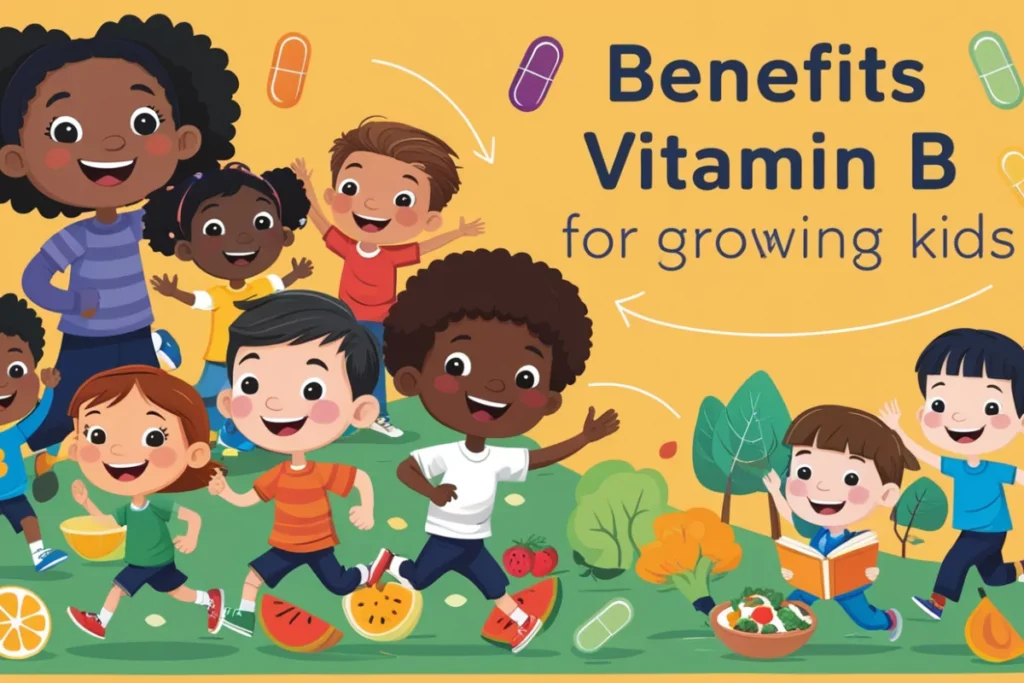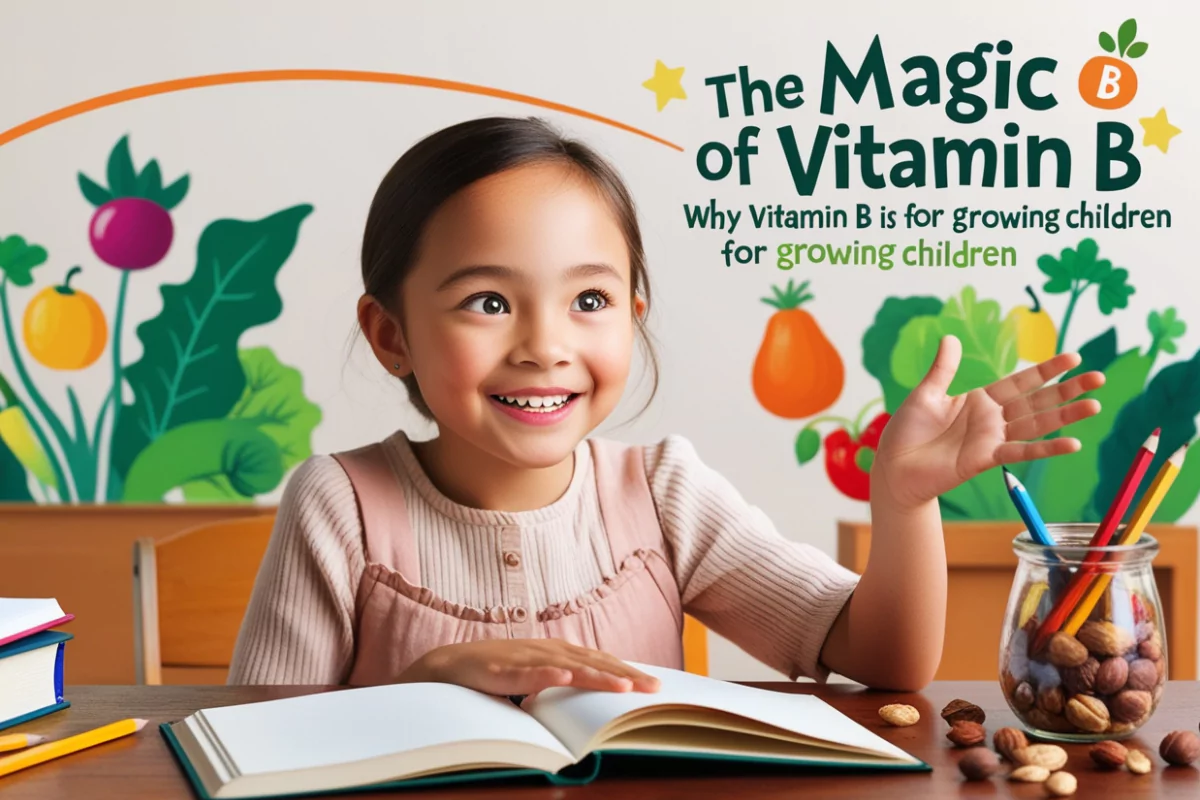Hello, Beautiful People! Have trouble with your child focusing or often getting sick? Don’t worry, I’m here with the solution. Your child is lacking Vitamin B.
I’m so sure about this because I’ve gone through these problems with my middle child. He used to remain tired, lack of focusing and often get sick.
In this blogpost, I’ll be sharing my experience so you don’t have to worry. I’ll share its role and benefits for your child’s growing bodies. Vitamin B will provide them energy and nourish their brain.
Let’s begin this together!
Table of Contents
The Types and Role of Vitamin B in Children’s Health
|
Vitamin B |
Role in Children’s Health |
|
B1, also called Thiamine |
|
|
B2, also called Riboflavin |
|
|
B3, also called Niacin |
|
|
B5, also called Pantothenic Acid |
|
|
B6, also called Pyridoxine |
|
|
B7, also called Biotin |
|
|
B9, also called Folate |
|
|
B12, also called Cobalamin |
|
Role of Vitamin B

1. Brain function
Vitamin B is essential for:
- Cognitive abilities
- Memory
- Concentration
- Mental performance.
2. Red blood Cell Formation
Vitamin B is crucial for preventing:
- Anemia
- Ensure optimal oxygen transport.
3. Nervous System Health
Vitamin B maintains healthy nerve function by:
- Aiding motor skills
- Coordination.
4. Immune System Support
Vitamin B regulates:
- Immune cell activity
- Antibody production
- Aiding defense against infections.
5. Growth and Development
Vitamin B supports growth and development as:
- Hormone production
- Protein synthesis
- Tissue repair.
6. Mood Regulation
Vitamin B is involved in:
- Neurotransmitter synthesis
- Influencing mood
- Emotional well-being
- Behavior.
The following video is about Vitamin B and all secrets you need to know:
Benefits of Vitamin B for Growing Kids

Energy Levels Increased with Vitamin B
B vitamins convert your child’s food into fuel. This keeps your child energized. Now your child can play, learn, and explore.
Improved Brain Function with Vitamin B
B vitamins improves brain function. It contributes to:
- Focus
- Concentration
- Memory.
Immune System Stronger with Vitamin B
B vitamins play a role in a healthy immune system. It helps the children fight off infections. So the child stays healthy.
Growth & Development with Vitamin B
B vitamins support cell growth and development. This is important for building strong bodies.
Food Sources of Vitamin B
B1 (Thiamine)
- Whole grains (brown rice, whole wheat)
- Legumes (beans, lentils)
- Nuts and seeds (sunflower seeds, peanuts)
- Pork, beef, and organ meats
- Fortified cereals
B2 (Riboflavin)
- Dairy products (milk, yogurt, cheese)
- Eggs
- Lean meats (chicken, turkey)
- Leafy greens (spinach, kale)
- Fortified cereals
B3 (Niacin)
- Meat (chicken, turkey, beef)
- Fish (salmon, tuna)
- Legumes (lentils, chickpeas)
- Nuts (peanuts, almonds)
- Whole grains (brown rice, whole wheat)
B5 (Pantothenic Acid)
- Meat (chicken, beef, pork)
- Avocado
- Whole grains (brown rice, whole wheat)
- Legumes (beans, lentils)
- Eggs
B6 (Pyridoxine)
- Poultry (chicken, turkey)
- Fish (tuna, salmon)
- Bananas
- Potatoes
- Fortified cereals
B7 (Biotin)
- Eggs
- Nuts (almonds, peanuts)
- Legumes (beans, lentils)
- Whole grains (oats, barley)
- Sweet potatoes
B9 (Folate)
- Leafy greens (spinach, broccoli)
- Legumes (black beans, chickpeas)
- Citrus fruits (oranges, grapefruit)
- Avocado
- Fortified cereals
B12 (Cobalamin)
- Animal products (meat, fish, poultry, dairy)
- Eggs
- Fortified plant-based foods (nutritional yeast, fortified cereals)
- Supplements for those on vegetarian or vegan diets.
Signs of Vitamin B Deficiency in Children
1. Fatigue and Weakness
2. Poor Appetite
3. Pale Skin
4. Digestive Issues
5. Mood Changes
6. Skin and Hair Problems
7. Neurological Symptoms
8. Delayed Growth and Development.
Importance of Balanced Nutrition
Our body is like a high-performance machine. To function at its best, it needs the right fuel. The same is the case with balanced nutrition. It provides your body with the essential nutrients it needs to function at its best.
The Symphony of Nutrients
Balanced nutrition doesn’t mean eating a lot of food. It means eating a variety of food groups having different nutrients. Your plate must have:
Fruits & Vegetables: Fruits and vegetables contain vitamins, minerals, and fiber. They:
- Support healthy digestion
- Boost the immune system
- Protect against chronic diseases.
Whole Grains: Whole grains provide
- Sustained energy,
- Keep you feeling full
- Contribute to heart health.
Lean Protein: Lean protein are:
- Essential for repairing tissues
- Hormone production and
- Maintain a healthy metabolism.
Healthy Fats: Healthy fats from nuts, seeds, and olive oil are needed for:
- Brain function
- Hormone regulation
- Nutrient absorption.
Dairy Products: Calcium-rich dairy products include milk and yogurt support strong bones and teeth.
The Benefits of Balanced Diet
You can have a lot of health benefits if you add Vitamin B to your daily life. Some benefits are:
- Enhanced Energy Levels
- Stronger Immune System
- Reduced Risk of Chronic Diseases
- Improved Mood and Well-Being.
- Healthy Weight Management.
Making Balanced Nutrition Achievable
Here are some tips to add balanced nutrition into your daily life:
- Plan your meals: Planning your meals for the whole week will help you make healthy choices.
- Read food labels: It is very important to read the food labels. Always choose foods with lower amounts of added sugars and unhealthy fats.
- Explore new recipes: Make healthy meals that your taste buds will love. Try different recipes from YouTube and enjoy with your children.
- Make small changes: Start by taking small steps like adding more fruits, and more vegetables into your diet.
Stay Hydrated
Water is necessary for overall health. Keep a reusable water bottle in your hand and sip throughout the day.
Supplements and Recommendations
Supplements should be taken under the guidance of healthcare professionals. It is important to note that supplements are beneficial but they should not replace a balanced diet. Here are some key points related to supplements and recommendations:
Consult a Healthcare Professional for Vitamin B:
Before starting any supplements, consult your child’s healthcare provider. He will assess your child’s individual needs. He’ll also review your child’s diet. After that, he’ll recommend appropriate supplements.
Focus on a Balanced Diet Containing Vitamin B:
Nutrient-dense foods should be the primary source of nutrients for your children. Supplements should only be used to fill gaps in nutrition.
Conclusion
In conclusion, Vitamin B is necessary for our child’s health and energy. We should explore different foods so our children will enjoy eating. Our food must contain nutrients and minerals i.e. it should be balanced. Visit a doctor if you feel that the deficiency of Vitamins can’t be filled with a balanced diet alone.
Monitor your child’s health regularly. Remember, only you’re responsible for your child’s health. Support your child physically and emotionally to make them future stars.
Let me know in the comments below that in which form are you giving your kids Vitamin B?
FAQ
1. Are supplements necessary for my 10 y/o son?
If your child is having a balanced diet then supplements aren’t recommended. But, if your child has nutrient deficiency then he should take supplements. It’s essential to consult with a healthcare professional, especially in the case of your little children.
2. What are the signs of vitamin deficiency in children?
Symptoms of Vitamin deficiency include:
- Fatigue
- Weakened immunity
- Poor growth or development
- Skin issues
- Mood changes.
3. What foods include Vitamin B?
Many delicious foods are naturally rich in B vitamins:
- Whole-wheat bread
- Brown rice
- Quinoa
- Chicken
- Turkey
- Fish
- Eggs
- Dairy Products
- Leafy Green Vegetables
- Bananas
- Oranges
4. Give good sources of B12 for vegetarians and vegans.
B12 is primarily found in animal products. Consider fortified foods like plant-based milk and cereals, or discuss B12 supplements with your pediatrician.




